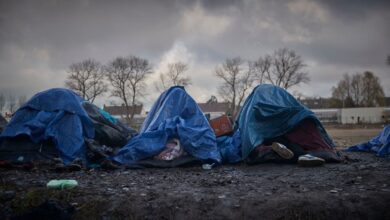First TV head-to-head between Sunak and Truss could have decisive impact on leadership battle

The candidates for the Conservative leadership are preparing for their first TV head-to-head debate, which could play a decisive role in determining who succeeds Boris Johnson as prime minister.
With many of the 160,000 Tory members likely to vote as soon as ballot papers arrive next week, the BBC showdown at 9pm on Monday could be the only real chance for Rishi Sunak and Liz Truss to make their pitch direct to those determining their fate.
The pair will clash over tax and immigration, but Labour insisted they should be grilled on how they would fund their “fantasy economics” plans, whether they would abolish non-dom status and how they would help families facing a £1,000 leap in energy bills this autumn.
Ms Truss’s plans for £30bn of immediate tax cuts, funded from borrowing, came under renewed scrutiny after three members of Margaret Thatcher’s last cabinet – Chris Patten, Norman Lamont and Sir Malcolm Rifkind – said that the “Iron Lady” would not have approved of them.
On the eve of the debate, Ms Truss set out proposals for a network of “full-fat freeports”, offering tax breaks, light-touch planning rules and scaled-back regulation in the hope of attracting investment and growth.
And Mr Sunak took a tough line on China, branding the east Asian country “the biggest long-term threat to Britain” and declaring he would ban its Confucius Institute cultural centres from the UK.
The weekend saw an increasingly bitter clash over immigration, as each pitched to the right in the hope of picking up votes from the Tory “selectorate” who will choose the country’s PM and who, according to polls, have a significantly more hostile attitude to migrants than the population at large.
Mr Sunak’s plans to house asylum seekers on detention ships off the coast of the UK and to withhold aid from developing countries that do not take back nationals who are denied the right to stay were branded “cruel” by Oxfam and “beyond the pale” by Christian Aid.
And Truss allies said the proposal to house migrants on cruise ships rather than in hotels would breach domestic and international law, effectively creating a chain of prison ships in areas trying to attract tourists.
Ms Truss said she would seek to sign up more countries to Rwanda-style agreements to accept asylum seekers deported from the UK, despite the fact that the scheme has cost £120m and failed to remove a single migrant since its introduction in April.
The foreign secretary said that her proposal for “designated investment zones” would unleash growth and innovation in areas right across the UK, attracting hi-tech industries such as AI. They also represent a swipe at Mr Sunak’s scheme for freeports, which she said gave Whitehall the power to pick winners and losers.
Under the scheme, the government would work with local communities to identify sites ripe for redevelopment, with a preference for previously developed “brownfield” sites.
She said that the scheme would be a cornerstone of her economic strategy and would help create new model towns like those of Bournville and Saltaire, the workers’ villages established by philanthropist businessmen in the Victorian era.
But her plan to pare back planning restrictions and regulation will raise concerns about poor-quality development and environmental damage, as well as the possibility of business simply being poached away from areas outside the zones.
Ms Truss said: “As prime minister, I will be laser-focused on turbocharging business investment and delivering the economic growth our country desperately needs.
“We can’t carry on allowing Whitehall to pick the winners and losers, like we’ve seen with the current freeport model. Instead, by creating these new investment zones we will finally prove to businesses that we’re committed to their futures and incentivise them to stimulate the investment that will help deliver for hardworking people.”
Mr Sunak promised a major hardening of government policy on China, seeking to outflank Ms Truss’s own confrontational stance towards Beijing as foreign secretary.
The former chancellor said he would close all 30 Confucius Institutes in the UK, which critics have labelled propaganda tools at a time of worsening relations between China and the West.
Mr Sunak accused China of “stealing our technology and infiltrating our universities” as well as bullying Taiwan and breaching the human rights of people in Hong Kong and Xinjiang.





